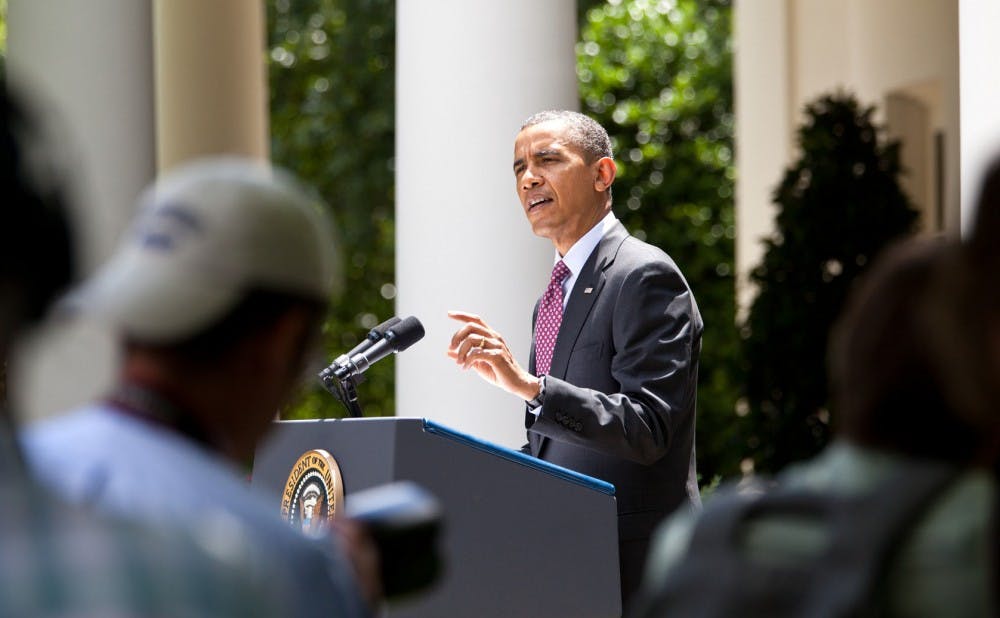Within days of the announcement, Duke students are already feeling the impact of President Donald Trump’s decision to end the Deferred Action for Childhood Arrivals program.
DACA was put into action in 2012 through an executive order by then President Barack Obama. Its goal was to protect undocumented immigrants who had come to the United States as children, allowing them to apply for work permits, get social security numbers and receive other federal benefits without fear of deportation.
About 800,000 immigrants between the ages of 15 and 36 have benefitted from the program. Most of them have lived in the United States longer than the country they emigrated from, and are often referred to as “Dreamers.”
The Duke community includes both students and faculty who are affected—both directly and indirectly—by DACA’s repeal. The University's administration was quick to respond to Trump’s announcement.
“In light of the decision to end DACA, Duke University restates its firm commitment to protecting the right of all students to learn and discover here, regardless of their background or immigration status,” President Vincent Price wrote in a statement last Wednesday.
The statement was the latest of several actions Duke has taken within the past year demonstrating its support of immigrants, undocumented or otherwise. Last December, the University promised to meet 100 percent of the demonstrated financial need of undocumented undergraduates, beginning with the class of 2021. In February, Duke filed an amicus brief alongside 16 universities opposing Trump’s order to ban immigration from seven Muslim-majority countries. The week before Trump’s decision to end DACA, Price sent Trump a letter imploring him to do just the opposite.
“The fact remains that hundreds of thousands of young people remain at risk,” wrote Michael Schoenfeld, vice president for public affairs and government relations, in an email. “We join with others in higher education, and many throughout the country, in urging Congress and the Trump Administration to enact permanent protections for these women and men.”
Some faculty are siding with Duke’s administration. Fritz Mayer, professor of political science, public policy and the environment, said he strongly disagreed with the president’s decision to end DACA.
“It’s ill-informed and counterproductive,” he said. “The fundamental premise that [Trump] seems to be working on is that Dreamers are a problem, and that we have to solve that problem. That’s just wrong. These people who came here as children are Americans in almost any sense of the word, except in the action of where they happen to be born.”
However, the question remains: what will happen to Duke’s Dreamers?
No one is sure right now, Mayer said, since the language behind the Trump administration's decision has left some room for ambiguity. In the repeal's current form, the government will phase out DACA such that it will no longer accept new applications for DACA work permits, but will allow existing permits to remain valid for up to two years from the date of Trump’s announcement. For those whose permits have already expired or are set to expire soon, enforcement of DACA's repeal will not take into effect for another six months from Monday, the date the repeal was announced. Until then, Duke students with DACA status are not at risk of deportation.
Trump has also urged Congress to replace DACA with legislation before the six-month deadline that would continue protecting the Dreamers. Public pressure on legislators nationwide following Trump’s announcement could prove effective in doing so.
“Every Dreamer has a story, and those stories are compelling,” Mayer said. “My hope is that the public can sustain its focus on this issue, sufficient to force Congress to vote.”
Some of Duke's Dreamers said they agreed.
“I’ve been overwhelmed with the support that the DACA community has been receiving online, everywhere,” said a Duke student with DACA status, who spoke on the condition of anonymity in fear of exposure. “People are standing up to Trump.”
The student added that living in the Duke bubble has afforded her some peace of mind from the ramifications of DACA's repeal. Others, she said, might not be so lucky.
“When you’re in the university world, you become disconnected,” she said. “So, even though I’m DACA, it’s not likely for [U.S. Immigration and Customs Enforcement] to come demand my documentation. Whereas my family doesn’t have that sort of protection.”
She added that the University has provided her with some reassurances in case she faces trouble.
“The University is very supportive of undocumented students,” she said. “If I have to fly home and do biometrics for the DACA application process, [Duke is] willing to help me financially. Duke is working to make sure we have peace of mind.”
When asked what her worst fear was, she answered without hesitation.
“Being deported,” she said. “Being separated from my family. If they’re deported and I’m not. Now the government has their information too, and they don’t have any documentation. But I do, because I’m a student.”
Mayer and the student also agreed on another point—that the Dreamers feel betrayed.
“When Obama came out with DACA, we put our trust in the government,” the student said. “We gave our information in order to receive work permits and be able to live our lives normally. Now they’ve taken it away, and the government now has a list of everyone who is DACA.”
Get The Chronicle straight to your inbox
Signup for our weekly newsletter. Cancel at any time.

